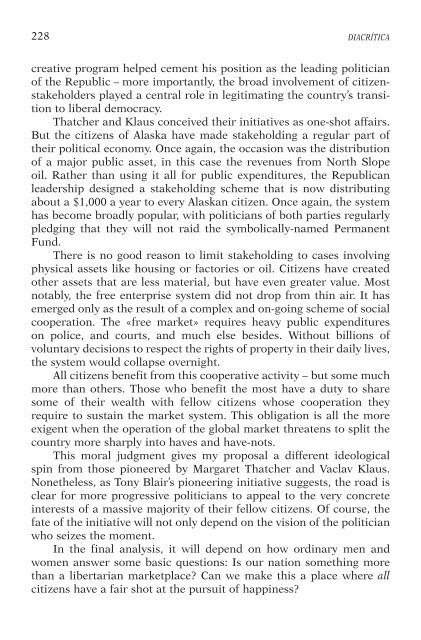Revista (PDF) - Universidade do Minho
Revista (PDF) - Universidade do Minho
Revista (PDF) - Universidade do Minho
You also want an ePaper? Increase the reach of your titles
YUMPU automatically turns print PDFs into web optimized ePapers that Google loves.
228<br />
DIACRÍTICA<br />
creative program helped cement his position as the leading politician<br />
of the Republic – more importantly, the broad involvement of citizenstakeholders<br />
played a central role in legitimating the country’s transition<br />
to liberal democracy.<br />
Thatcher and Klaus conceived their initiatives as one-shot affairs.<br />
But the citizens of Alaska have made stakeholding a regular part of<br />
their political economy. Once again, the occasion was the distribution<br />
of a major public asset, in this case the revenues from North Slope<br />
oil. Rather than using it all for public expenditures, the Republican<br />
leadership designed a stakeholding scheme that is now distributing<br />
about a $1,000 a year to every Alaskan citizen. Once again, the system<br />
has become broadly popular, with politicians of both parties regularly<br />
pledging that they will not raid the symbolically-named Permanent<br />
Fund.<br />
There is no good reason to limit stakeholding to cases involving<br />
physical assets like housing or factories or oil. Citizens have created<br />
other assets that are less material, but have even greater value. Most<br />
notably, the free enterprise system did not drop from thin air. It has<br />
emerged only as the result of a complex and on-going scheme of social<br />
cooperation. The «free market» requires heavy public expenditures<br />
on police, and courts, and much else besides. Without billions of<br />
voluntary decisions to respect the rights of property in their daily lives,<br />
the system would collapse overnight.<br />
All citizens benefit from this cooperative activity – but some much<br />
more than others. Those who benefit the most have a duty to share<br />
some of their wealth with fellow citizens whose cooperation they<br />
require to sustain the market system. This obligation is all the more<br />
exigent when the operation of the global market threatens to split the<br />
country more sharply into haves and have-nots.<br />
This moral judgment gives my proposal a different ideological<br />
spin from those pioneered by Margaret Thatcher and Vaclav Klaus.<br />
Nonetheless, as Tony Blair’s pioneering initiative suggests, the road is<br />
clear for more progressive politicians to appeal to the very concrete<br />
interests of a massive majority of their fellow citizens. Of course, the<br />
fate of the initiative will not only depend on the vision of the politician<br />
who seizes the moment.<br />
In the final analysis, it will depend on how ordinary men and<br />
women answer some basic questions: Is our nation something more<br />
than a libertarian marketplace? Can we make this a place where all<br />
citizens have a fair shot at the pursuit of happiness?











![Programa [pdf] - cehum - Universidade do Minho](https://img.yumpu.com/17305425/1/190x135/programa-pdf-cehum-universidade-do-minho.jpg?quality=85)




